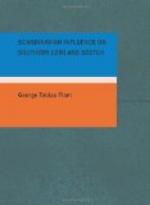23. SOME WORDS THAT ARE NOT SCANDINAVIAN LOANWORDS.
We have spoken in Sec.Sec.10, 13, 20 and 22, of a number of words that are to be considered regular Sco. developments of O.E. words. The following words have also generally been derived from the Scand., but must be considered native, or from sources other than Norse:
BLAIT, adj. backward,
must be traced to O.E. bl[-e]at,
rather than to
O.N. blout. O.N. ou, au is
always ou
or oi in
Sco.
BREID, sb. breadth,
not Norse braeidde nor Dan. bredde,
but native Eng.
CUMMER, sb. misery,
wail, seems uncertain. It corresponds in
form and usage
exactly to Norse kummer, but mb > mm
is
natural and occurs
elsewhere in Sco., cp. slummer,
“slumber,”
which need not be derived from Norse slummer
or
any L.G. word.
The usage of the word is peculiarly Scand.
DEAD, sb. death. Not Dan.-Norse doed, but English “death.”
FALD, vb. to fall.
Skeat says the d is due to Scand.
influence, but
cp. boldin from bolna (older bolgna).
So
d after
l in fald may be genuine. Besides
the O.N. word
is falla,
later Dan. falde.
FERDE, ordinal of four, not Norse fjerde. See Sec.19.
FLATLYNGIS, adv. flatly,
headlong, looks very much like Norse
flatlengs
and corresponds perfectly in meaning. The Norse
word is, however,
a late formation, apparently, and _-lyngs_
is a very common
adverbial ending in Sco.
HAP, vb. to cover up,
to wrap up, cannot come from O. Sw.
hypia,
as y could not become a.
LEDDER, sb. leather.
Not from Dan. leder, for cp. Sec.19;
besides the vowel
in the Dan. word is long.




